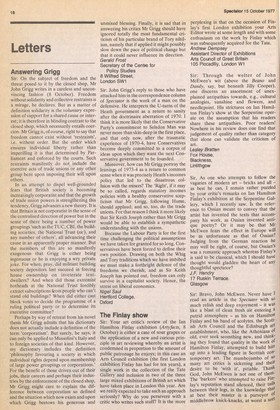Answering Grigg
Sir: On the subject of freedom and the threat posed to it by the closed shop, Mr John Grigg writes in a careless and uncon vincing fashion (8 October). Freedom without solidarity and collective restraints is a mirage, he declares. But as a matter of definition solidarity is the voluntary expression of support for a shared cause or inter est; it is therefore in blinding contrast to the closed shop, which necessarily entails coercion. Mr Grigg is, of course, right to say that freedom cannot exist without 'restraints', i.e. without order. But the order which ensures individual liberty rather than imperilling it is that determined by Parliament and enforced by the courts. Such restraints manifestly do not include the coercive acts of trade unions or any other group bent upon imposing their will upon others.
In an attempt to dispel well-grounded fears that British society is becoming increasingly corporatist and that the growth of trade union powers is strengthening this tendency, Grigg advances a new theory. It is that Britain is not corporatist in the sense of the centralised direction of power but in the sense of there being a number of power groupings such as the TUC, CBI, the building societies, the National Trust (sic), and any number of others', all advancing their cause in an apparently proper manner. But the members of this are so manifestly exogenous that Grigg is either being ingenuous or he is enjoying a wry private joke. For when, pray, did militant building society depositors last succeed in forcing house ownership on inveterate tentdwellers? And when did those extremist hotheads at the National Trust forcibly extract subscriptions f.rom people who can't stand old buildings? When did either cast block votes to decide the programme of a ruling political party or to determine its executive committee?
Perhaps by way of retreat from his novel thesis Mr Grigg admits that his dictionary does not actually include a definition of the term 'corporatism'. But surely, he says, it can only be applied to Mussolini's Italy and to foreign societies of that kind. However, my dictionary includes the definition 'philosophy favouring a society in which individual rights depend upon membership of large power groupings or corporations.' For the benefit of those driven out of their jobs, their careers and perhaps their industries by the enforcement of the closed shop, Mr Grigg might care to explain the difference between corporatism so defined and the situation which now exists and upon which Grigg bestows his generous and unmixed blessing. Finally, it is sad that in answering his critics Mr Grigg should have ignored totally the most fundamental criticism of his particular brand of Tory nihilism, namely that if applied it might possibly slow down the pace of political change but that it could never influence its direction. Gerald Frost Secretary of the Centre for Policy Studies 8 Wilfred Street, London SW1


































 Previous page
Previous page